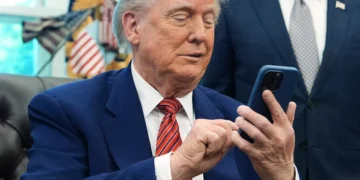Washington Should Engage with Ethnic Chinese and Asians, Not Let Beijing Speak for Them
In recent years, there has been a growing concern about China’s influence and control over ethnic Chinese and Asian communities around the world. As the world’s second-largest economy and a major global power, China has been using its economic and political clout to assert its dominance over these communities, often at the expense of their own voices and identities. This is a worrying trend that Washington must address and take action against.
It is no secret that China has been actively trying to expand its influence and soft power through various means, including its Belt and Road Initiative and Confucius Institutes. However, one of the most concerning tactics is its attempt to claim to speak for all ethnic Chinese and Asians, regardless of their nationality or beliefs. This is not only a false representation, but it also undermines the diversity and individuality of these communities.
The reality is that the ethnic Chinese and Asian communities are incredibly diverse, with different cultures, languages, and histories. To assume that Beijing can speak for all of them is not only ignorant but also dangerous. It erases the unique identities and struggles of these communities and reduces them to a monolithic entity under China’s control.
Moreover, China’s attempts to speak for all ethnic Chinese and Asians often come at the expense of their own voices and perspectives. Beijing’s authoritarian regime does not tolerate dissent and actively suppresses any form of criticism or opposition. This means that many ethnic Chinese and Asian individuals who speak out against China’s actions are silenced or even punished. By allowing Beijing to claim to speak for them, Washington is inadvertently silencing the voices of these communities and giving China even more power over them.
It is time for Washington to take a stand and engage directly with ethnic Chinese and Asian communities, rather than letting Beijing speak for them. This means actively listening to their voices, understanding their unique experiences and struggles, and supporting their efforts to preserve their identities and cultures.
One way to do this is by promoting cultural and educational exchanges between the United States and these communities. This will not only help to bridge the gap between different cultures but also provide a platform for ethnic Chinese and Asian individuals to share their perspectives and experiences. By doing so, Washington can show its support for these communities and demonstrate that they are not just pawns in China’s game of power.
Another crucial step is to address the issue of discrimination and racism faced by ethnic Chinese and Asian communities in the United States. As the COVID-19 pandemic has shown, these communities have been unfairly targeted and scapegoated, leading to a rise in hate crimes and discrimination. Washington must take a strong stance against such acts and work towards creating a more inclusive and accepting society for all.
Furthermore, the United States should also actively engage with Asian countries and support their efforts to counter China’s influence. By building strong partnerships and alliances with these nations, Washington can create a united front against China’s attempts to dominate the region. This will not only benefit the United States but also help to protect the sovereignty and interests of these countries.
In conclusion, Washington must not let Beijing claim to speak for all ethnic Chinese and Asians, nor should it turn a blind eye to China’s attempts to control and manipulate these communities. Instead, the United States should take a proactive approach and engage directly with these communities, support their voices and identities, and work towards countering China’s influence. By doing so, Washington can show its commitment to promoting diversity, inclusivity, and democracy, and send a strong message to Beijing that it will not allow any one country to speak for all.


